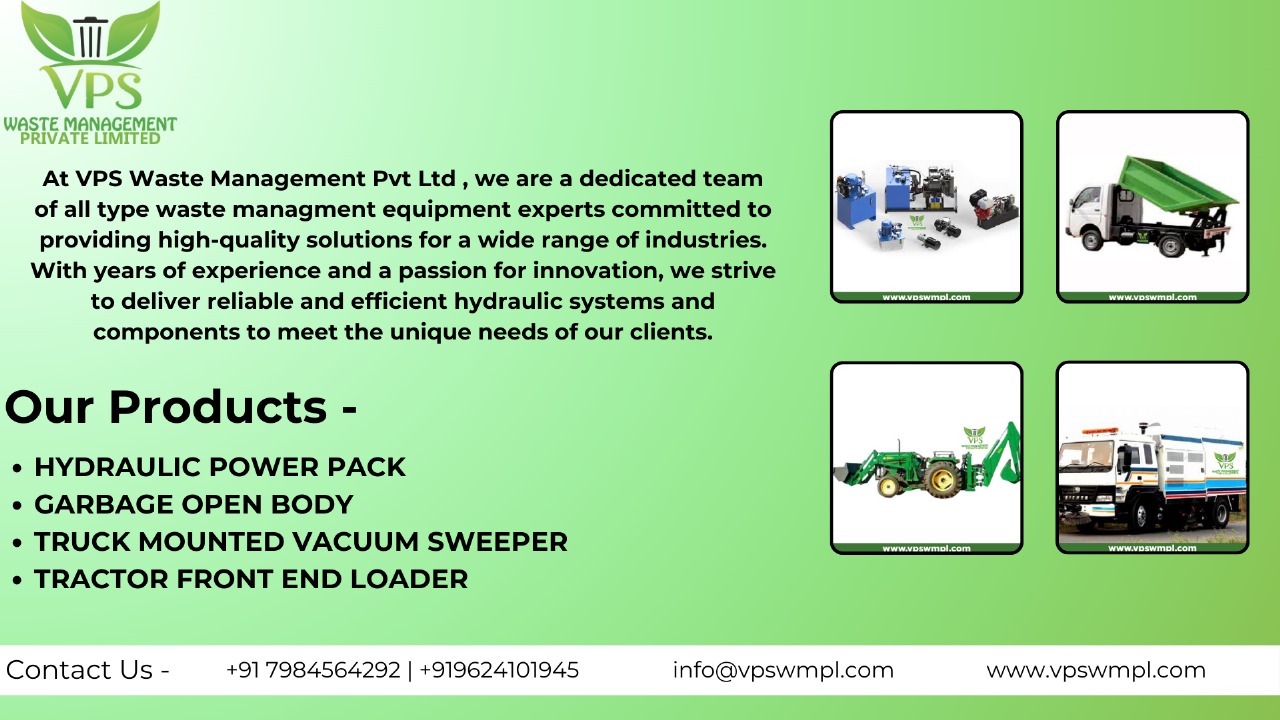Solid Waste Handling Equipment
SolidWaste Handling Equipment refers to machinery designed to collect, transport, process, and
dispose of solid waste materials efficiently and sustainably. This
equipment is essential in waste management systems, especially in urban areas,
industrial facilities, and municipal environments. It includes garbage
trucks, compactors, shredders, balers, waste
sorters, dumpsters, and landfill equipment.
10 FAQs of Solid Waste Handling Equipment
- What types of solid waste
handling equipment are available?
Types include garbage trucks, compactors, waste shredders, balers, conveyors, and sorting machines. - How does a waste compactor
work?
A waste compactor compresses waste material into a smaller volume, reducing the frequency of collection trips and maximizing storage efficiency. - Can solid waste handling
equipment be used for both industrial and municipal waste?
Yes, these machines are versatile and can handle various waste types, including residential waste, construction debris, hazardous materials, and recyclables. - What are the environmental
benefits of using solid waste handling equipment?
These machines help reduce landfill waste, promote recycling, and facilitate the composting or energy recovery of waste materials. - How do garbage trucks
collect and transport waste?
Garbage trucks use mechanized lifting systems to pick up waste bins, load them into the truck’s body, and compact the waste to maximize truck capacity. - What is the difference
between a manual and automated waste sorting system?
Manual sorting requires human intervention to separate waste, while automated systems use conveyors, sensors, and robotic arms to automatically sort recyclables and waste. - Can solid waste handling
equipment be used in hazardous waste disposal?
Yes, specialized equipment is designed for handling hazardous waste materials such as chemicals, medical waste, and other dangerous substances. - Are there waste handling
machines designed for recycling?
Yes, there are machines such as baling presses, shredders, and sorting conveyors designed specifically for processing and preparing recyclables for reuse. - What is a waste shredder,
and what is it used for?
A waste shredder breaks down large waste materials (such as plastics, wood, or metals) into smaller, manageable pieces for further processing or disposal. - How do waste balers work?
Waste balers compact waste materials such as paper, cardboard, and plastic into dense bales, making them easier to transport, store, and recycle.
Applications of Solid Waste Handling Equipment
- Municipal Waste Collection
Used for collecting household waste and street waste in urban environments. - Industrial Waste Management
Essential in processing and disposing of waste generated by manufacturing plants and factories. - Construction and Demolition
Waste Disposal
Used to manage building debris, concrete, and demolition materials efficiently. - Recycling Plants
Sorting, shredding, and compacting recyclable materials like paper, plastic, and metals for reuse. - Hazardous Waste Disposal
Handling dangerous or toxic waste materials, including chemicals, medical waste, and contaminated materials. - Landfill Operations
Equipment used in the management of waste in landfills, including compacting and leveling waste. - Waste-to-Energy Plants
Equipment for handling waste that can be converted into energy, such as incinerators and gasification units. - Composting Facilities
For processing organic waste like food scraps, yard waste, and agricultural residues into compost. - Medical Waste Disposal
Specialized equipment for safely handling and disposing of biomedical and pharmaceutical waste. - Agricultural Waste
Management
For processing crop residue, animal waste, and other organic materials into usable by-products.
Benefits of Solid Waste Handling Equipment
- Efficient Waste Collection
and Transport:
Increases the efficiency of waste management operations by reducing labor
and time required for waste collection and transportation.
- Waste Volume Reduction: Equipment like compactors
and shredders reduce waste volume, optimizing storage and reducing
collection frequency.
- Recycling and Resource
Recovery:
Facilitates the segregation, sorting, and processing of recyclable
materials, promoting sustainability and reducing the need for virgin
resources.
- Reduced Environmental Impact: Proper waste handling
equipment minimizes environmental hazards by reducing landfill waste,
controlling emissions, and facilitating waste-to-energy conversion.
- Safety and Hygiene: Reduces the risk of exposure to harmful materials and ensures that waste is safely contained
and processed, minimizing health risks for workers and the public.
- Cost Savings: By improving efficiency
and reducing waste volume, solid waste handling equipment can result in significant
cost savings in waste disposal operations.
- Compliance with Regulations: Ensures that waste is
processed and disposed of in compliance with environmental and safety
regulations.
- Versatility: Can handle a wide range of
waste types, from household garbage to industrial and hazardous materials.
- Improved Resource Recovery: Through advanced sorting
and processing, equipment helps recover valuable materials like metals,
paper, and plastics, which can be recycled or reused.
- Enhanced Public Health: Proper waste management
equipment reduces the spread of diseases and pests associated with
improperly handled waste.
Contact
us more details:
Call: +91 7984564292 +919624101945
Email: vpswmpl@gmail.com info@vpswmpl.com
Address: Ahmedabad Office : Shed No. B-21, Shree Mahalaxmi Estate, Wandervat
Talav, Near Shankeshwar Estate, GIDC Vatva, Ahmedabad - 382440, Gujarat, INDIA.

